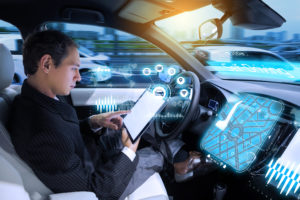The introduction of self-driving vehicles carrying only passengers has the potential to create significant societal benefits by reducing the necessity to own a car.
On the other hand, there are potential challenges that may arise from the introduction of these vehicles if effective regulation is not in place.
So the Law Commissions of England & Wales and Scotland have published proposals on the regulation of highly automated vehicles that operate without a driver (or “user-in-charge”).
Potential benefits include reduced congestion and traffic accidents, and improved accessibility for disabled people.
This is the Law Commissions’ second consultation paper published on the potential future regulation for automated vehicles. It forms part of a three-year project commissioned by the UK Government’s Centre for Connected and Autonomous Vehicles.
The second consultation paper focuses on how completely automated trips might be supplied to the public in vehicles that can travel empty or only with passengers and no driver or user-in-charge. These have the catchy acronym HARPS (Highly Automated Road Passenger Services).

Benefits and challenges of self-driving passenger-only vehicles
It’s assumed that road congestion will reduce as people share self-driving vehicles and use them in combination with existing public transport.
Improved safety; through sensors, data sharing, safer driving behaviour and faster-than-human reaction times, HARPS could substantially reduce the number of people killed on British roads.
Increased accessibility for older people and disabled people; HARPS could provide accessible services that are more affordable than current alternatives. This could allow older people and disabled people, especially those on low incomes, to travel more.
If fewer cars are on the road an expansion of cycle routes could result, with the additional benefits to the environment, reducing carbon emissions and improved fitness for more people.
On the other hand, there are potential challenges that may arise from the introduction of these vehicles if effective regulation is not in place. These include:
Traffic being blocked, if a self-driving car freezes when confronting unexpected weather conditions or unknown obstacles (including, possibly, leaves or plastic bags).
Reduced accessibility for those who rely on a driver to assist them, for example by helping them into the vehicle or accompanying them from their door.
Increased congestion if many self-driving vehicles are introduced before private car use has reduced. This will be compounded if HARPS drive around empty, waiting to be utilised.
The Law Commissions’ consultation paper asks a series of questions to examine the types of changes that may be required to regulate HARPS. These include:
- Whether HARPS should be subject to a new, single, national system of operator licensing?
- If so, what obligations should fall on HARPS operators? For example, relating to maintenance, remote supervision and the reporting of accidents?
- Who should these obligations fall on when a passenger-only vehicle is privately-owned?
- How can we ensure that HARPS are accessible?
- What regulatory tools should be used to control congestion and cruising?
- How should HARPS be integrated with public transport?
Nicholas Paines QC, Commissioner at the Law Commission of England and Wales says: “Self-driving cars have the potential to revolutionise mass transit by enhancing safety, efficiency and accessibility.
“Responses to our consultation are vital for ensuring that our proposed regulatory framework will allow the full potential of self-driving cars to be realised, and we hope as many people as possible will respond.”
George Freeman, Minister for the Future of Transport said: “We are on the cusp of a quiet revolution in the technology of transport and mobility. Automated navigation and digital control technology have the potential to transform the way traffic is managed, improving road safety, reducing congestion and pollution and improving accessibility for people with mobility issues.
“The UK is a world leader in this technology and Government is investing over £250 million to support industry research and trials to ensure the technology is introduced onto our roads in the safest way.
“We also intend to lead the work in setting the right regulatory standards. That’s why we are conducting a major Regulatory Review on the Future of Mobility and recently launched a new project to create the world’s first safety scheme for self-driving vehicles, CAV PASS, and have commissioned the Law Commissions to look into the legal and regulatory requirements for this technology.”
More details are available at https://www.lawcom.gov.uk/project/automated-vehicles/
Karen Bright is a Partner and Head of Litigation. Should you require any further advice or assistance, please contact us at litigation@bishopandsewell.co.uk or call her, on 0207 7079 2410.
The above is accurate as at 08 January 2021. The information above may be subject to change during these ever-changing times.
The content of this note should not be considered legal advice and each matter should be considered on a case by case basis.





